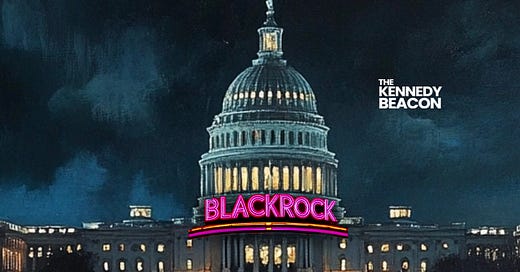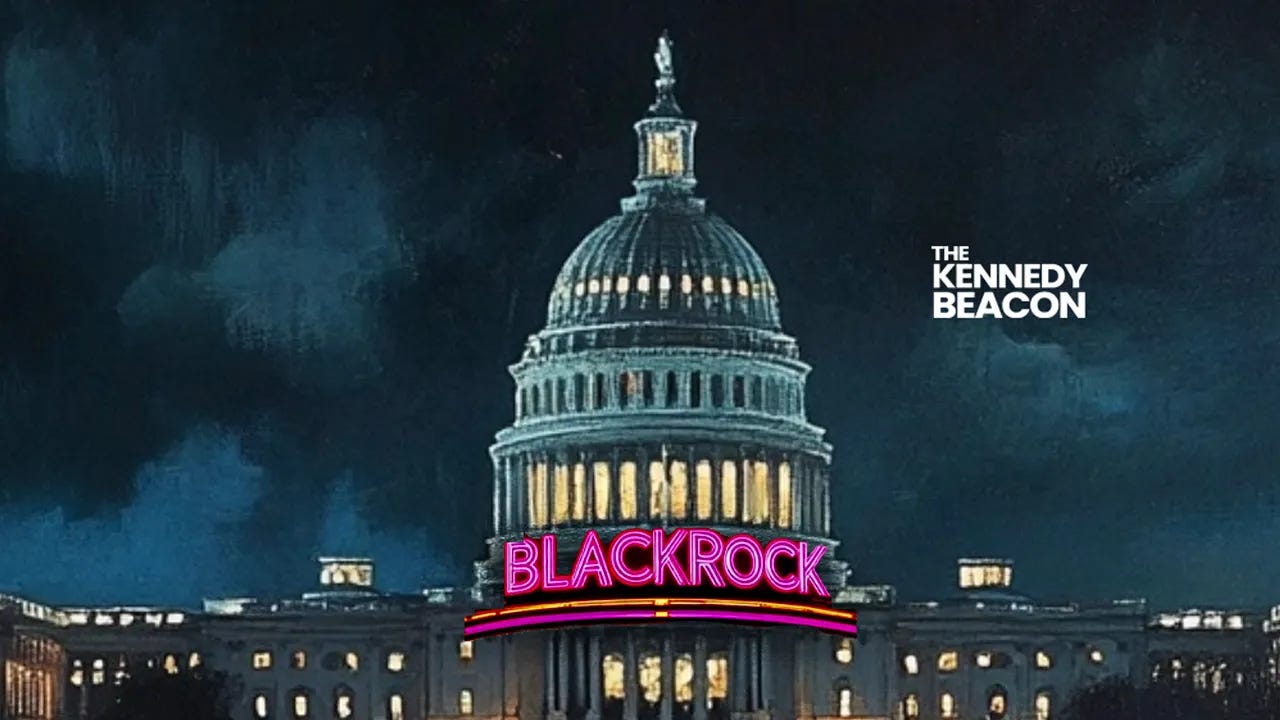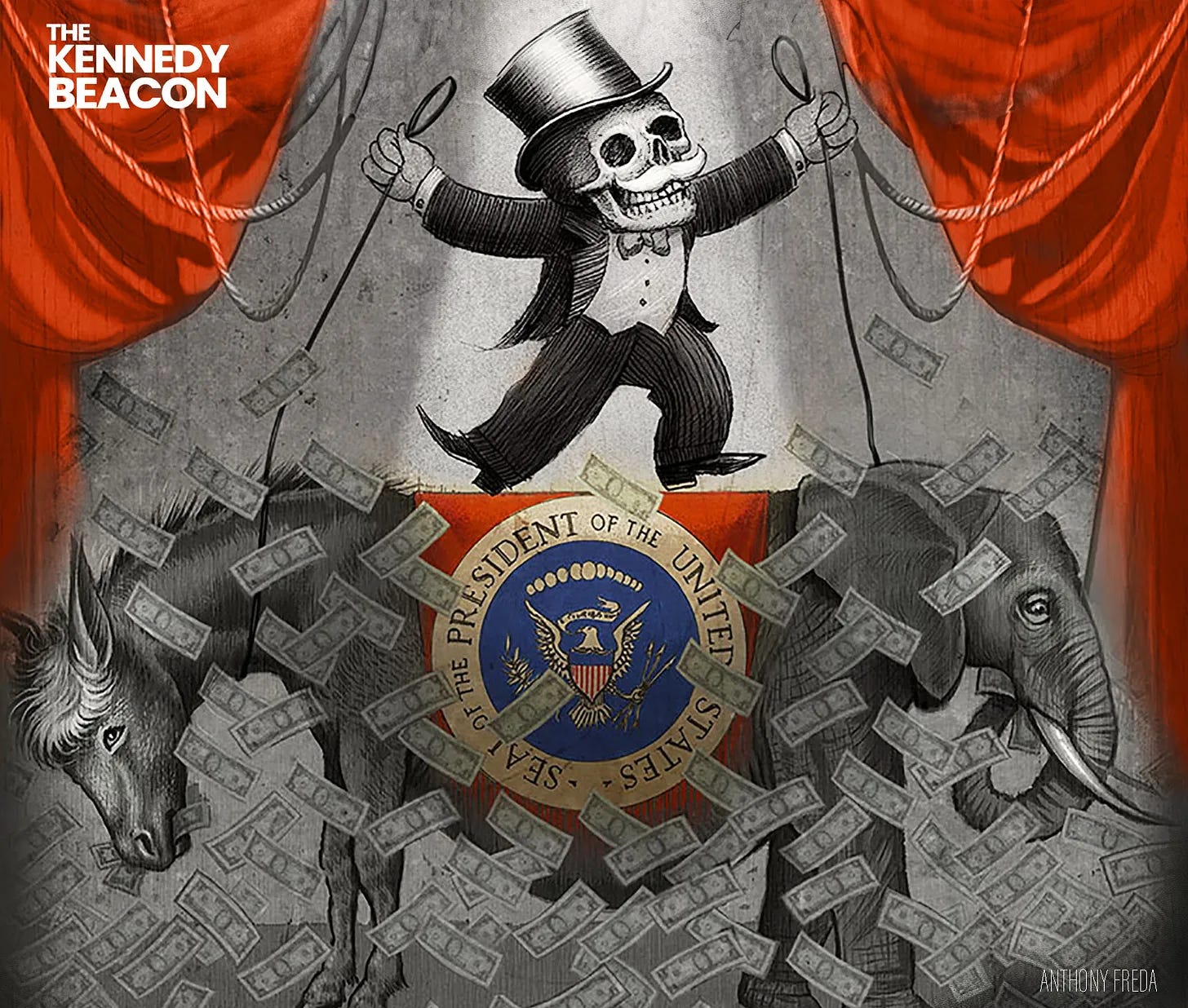by Elsa Hjalmarsson Lyons, The Kennedy Beacon
What do Bernie Sanders, Vivek Ramaswamy, and Robert F. Kennedy Jr. have in common?
They’ve all warned the American people of the concentrated power of three investment firms: BlackRock, Vanguard, and State Street. These firms are known as “passive” investors, but they manipulate the economy in ways that are anything but passive.
Sanders has called these three companies an “oligarchy.” Ramaswamy regularly refers to them as a “cabal.” And Kennedy focuses on the profits they squeeze from a housing market that is increasingly hostile to ordinary Americans.
Meanwhile, both the Trump and Biden administrations flirted with BlackRock executives and pandered to BlackRock interests. The likely nominees of our two major political parties – former president Trump and Vice President Harris – have long-standing relationships with Wall Street mega-investors.
It’s not an exaggeration to say that BlackRock owns a sizable slice of the world. The company invests in nearly all the biggest media and tech platforms, but also owns stock in fossil fuel companies like ExxonMobil and Chevron, as well as pharmaceutical/biotech giants like Pfizer and Johnson & Johnson. Significantly for many American voters, BlackRock also finances private equity groups that are rapidly accumulating massive portfolios of single-family homes, like Blackstone and Pretium Partners.
According to Reuters, BlackRock’s total Assets Under Management (AUM) equaled about $10.5 trillion as of this April. Analysts at Morgan Stanley estimate that this value will climb to $15 trillion in the next four years. To put these numbers in perspective, the collective AUM of the wealth management industry globally was about $120 trillion in 2023 (predicted to hit $145.4 trillion in 2025).
But it’s impossible to fully grasp BlackRock’s influence without understanding its connections to The Vanguard Group and State Street Corporation. BlackRock’s biggest shareholders are Vanguard and State Street, which together own about 13% of BlackRock’s stock. BlackRock and Vanguard are also State Street’s top two shareholders, with a combined 20% of shares.
Are you dizzy yet? You should be. The relationship between these three companies is like the relationship between the Father, the Son, and the Holy Ghost; a perverse parody of the Trinity. They’re separate, but united. And indeed, the magnitude of their power is almost godlike.
New research by Boston University School of Law professor Scott Hirst shows that BlackRock, Vanguard, and State Street currently own enough stock in S&P 500 companies to control 25% of shareholder votes. In 2019, Hirst co-authored a paper called, “The Specter of the Giant Three” with Harvard professor Lucian A. Bebchuk. In the paper, Hirst and Bebchuck predict that 20 years from now the “Giant Three” will be casting a whopping 40% of S&P 500 shareholder votes.
But when people express concern about the control these companies could (and already do) exert over the global economy, the mainstream media brands them conspiracy theorists. The Washington Post’s “Fact Checker” column assigned RFK Jr.’s criticisms of BlackRock “Four Pinocchios” out of a possible four – the folksy metric they use to discredit political renegades. The November 2023 article pecked at Kennedy’s word choice and presented a convoluted defense of Wall Street’s involvement in the housing market, insisting that the percentage of single-family homes owned by investment firms is actually negligible.
But as Daniel Kovalik explains in an earlier Kennedy Beacon article, the 446,000 homes that mega-investors now own should have been the ones most accessible to young and working-class buyers. The Post also claimed that BlackRock, Vanguard, and State Street do not buy single-family homes – a flimsy claim considering that the “Big Three” firms do invest in many of the companies that are plucking these homes off the market.
CNBC, Business Insider, and Reuters all ran pieces like the one in the Post, around the same time. It’s worth noting that BlackRock and Vanguard together control 13% of shares in Comcast, CNBC’s parent company. BlackRock also owns significant shares in Axel Springer SE, the German media conglomerate that owns Business Insider, as well as the Thomson Reuters Corporation, which owns Reuters. Jeff Bezos, who owns The Washington Post, has major ties to BlackRock, Vanguard, and State Street – they’re the top three institutional investors in Amazon.
You can perform this kind of financial archaeology with pretty much every mainstream media company, from Fox to MSNBC, and get the same results; BlackRock, Vanguard, and State Street own a little of everything.
We need a president who isn’t a part of this vast web of influence. But both Kamala Harris and Donald Trump are swaddled in its sticky fibers.
Former president Trump’s relationship with Wall Street received a flurry of attention in July, when he told a Bloomberg reporter that JPMorgan CEO Jamie Dimon “is somebody that [he] would consider” for the position of Treasury Secretary if reelected. There were also some vague rumors involving BlackRock CEO Larry Fink as a possible pick. In a Truth Social post, Trump dismissed these possibilities, claiming that he “never discussed, or thought of, Jamie Dimon or Larry Fink for Secretary of the Treasury[.]”
But critics of Trump’s entanglement with Wall Street mega-investors don’t have to grasp at rumors; they could simply look back to the realities of the former president’s administration. In 2016, Trump nominated Steve Mnuchin – a former Goldman Sachs banker – for the position of Treasury Secretary. During the 2008 financial crisis, the Guardian reported that Mnuchin had become known as the “foreclosure king” because of the thousands of homeowners he evicted after buying a mortgage bank called IndyMac (he renamed it OneWest Bank). A Long Island judge ruled that the bank’s policies under Mnuchin’s leadership were “inequitable, unconscionable, vexatious and opprobrious.” This is what RFK Jr. was talking about when, in June, he posted this on X: “Despite rhetoric to the contrary, President Trump has a weakness for swamp creatures, especially corporate monopolies, their lobbyists, and their money. After promising to drain the swamp, instead, he hired swamp creatures to regulate their own industries.”
Mnuchin maintained a coziness with Wall Street throughout his government tenure, but his loyalty to the industry was never more devastating for the American people than during the pandemic. At a White House Coronavirus Task Force press conference on March 27, 2020, Trump told reporters that his administration was working closely with the finance industry to stabilize the economy during the pandemic. “We have brilliant people that I’m taking from Wall Street with Secretary Mnuchin, who’s done an incredible job[...] people like Larry Fink we’re talking to, and – that’s BlackRock,” Trump said. “They don't want money,” he clarified, “they don't want—I mean, will they get something? Yes, maybe they'll get—who knows? Peanuts, what they want—compared to what they would normally get.”
But conflicts of interest aren’t that simple. Emails released in June of 2021 show that the Federal Reserve’s pandemic bailout programs were a collaboration between Mnuchin, Federal Reserve Chair Jerome H. Powell, and BlackRock’s Larry Fink. Yes, the same programs that, as Propublica notes, coddled big private equity firms while millions of small businesses caved in. BlackRock performed consulting services for the government while the bailouts were being conceived and executed. According to Pensions & Investments, the company helped the federal reserve choose which bonds and ETFs to purchase, often making decisions about firms that it partially owns. As University of Chicago professor William Birdthistle put it, the firm became “about as close to a government arm as you can be, without being the Federal Reserve.” If that’s not plutocracy, I don’t know what is.
But Kamala Harris got herself equally enmeshed with BlackRock and Wall Street under the Biden administration. In fact, her personal economic advisor as vice president was Mike Pyle, who served as BlackRock’s global chief investment strategist. Pyle isn’t the only BlackRock executive who ended up working for the Biden administration. Early on, Biden picked Brian Deese, formerly BlackRock’s head of sustainable investing, to direct the National Economic Council. Our current treasury secretary, Wally Adeyemo, used to be Larry Fink’s chief of staff. But Harris’ advisor was possibly the most Wall Street-entrenched of them all. When he was chosen to join the Biden administration in 2021, Pyle had been working in the upper echelons of BlackRock for seven years.
Maybe this is why Wall Street celebrated when Harris became the presumptive Democratic nominee. Within 24 hours of her campaign announcement, Harris had already raised $81 million, mostly from Wall Street donors, as reported by FT. One of these donors was Ralph Schlosstein, who co-founded BlackRock with Larry Fink and six other partners. Jonathan Gray, the COO of Blackstone, is also supporting Harris, according to Semafor. Blackstone is one of the most aggressive corporate snatchers of single-family homes; Vanguard and BlackRock are its top two shareholders, with State Street in fourth place.
Wall Street liked Harris in 2020, too. As Wells Fargo executive Bill Daley put it that year, “Is she a progressive? Yes. Is she someone who wants to burn the building down? No. I think she wants to strengthen the building.”
It was true in 2020 and it’s true now: Wall Street mega-donors seem to know something about Harris that she has not deigned to disclose to voters. Namely, they seem to believe that if they ask nicely, she will readily accept their policy suggestions.
For example, multiple mega-donors have publicly called on Harris to replace Lina Khan as chair of the Federal Trade Commission (FTC). Khan has been notoriously tough on Big Tech and Big Business throughout her first three years in office, fiercely committed to antitrust enforcement – so much so that LinkedIn co-founder and venture capitalist Reid Hoffman lambasted her on national television for “waging war on American business.” Hoffman, a billionaire, has so far donated $7 million to Harris’ campaign. He told CNN that he “would hope that Vice President Harris would replace [Khan]” if she were elected president.
Hoffman’s interests are attached not just to his own contributions, but also those he is eliciting from his buddies in Silicon Valley and on Wall Street. And he’s only one of many donors who have made public statements asking Harris to neutralize Khan.
Harris has said very little about her economic policy aims. The tidbits she has offered have been so ill-defined as to be almost entirely without substance. In a stump speech she delivered last week in Atlanta, Harris promised that “building up the middle class [would] be a defining goal of [her] presidency.” She managed to transmit a few details about how she would accomplish this – such as banning the “hidden fees and surprise late charges that banks and other companies use to pad their profits” and “cap[ping] unfair rent increases” – but shared nothing resembling a comprehensive economic plan.
Harris is the only one of our three major presidential candidates whose campaign website does not display specific policy points. By staying vague on the economy, she has managed not to alienate Wall Street donors. But how long will Harris pander to corporate interests? Can we really expect her to put her foot down as president after a tiptoeing campaign?
There is much more to say about both major party candidates’ connections to BlackRock and its peers. We won’t learn anything from their rhetoric; we have to examine their records and their relationships.
RFK Jr. has proven that he really will dismantle Wall Street’s shadow branch of government. There are no BlackRock executives whispering in his ear. As reported by the Beacon, he backed up his support for the “ape retail rebellion” and his pledge to deliver “aggressive Wall Street reforms” with a $24,000 investment in GameStop. The gaming company’s stocks are popular among a scrappy coalition of young people who, together, have managed to buy enough shares in faltering companies to sabotage the short-selling strategies of institutional investors. The $24,000 Kennedy invested came out of the legal fees he earned from suing the infamous big polluter Monsanto.
Now, that’s a changemaker. If you want a government that’s independent from corporate interests, you’re going to have to vote for an independent.
Elsa Hjalmarsson Lyons is a student at Amherst College








This country needs to take on the anti-trust and other violations of the whole "private equity firm' debacle. Currently reading "Plunder" as recommended by Catherine Austin Fitts. Watch her regularly on CHD's Financial Rebellion segment. She is brilliant!
This is a BRILLIANT must-read. I am sending it to everyone in my network. Thank you, Elsa! Phenomenal article.